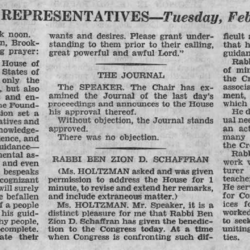Date of Prayer: 19 February 1974
Sponsor: Rep. Elizabeth Holtzman (D-NY)
Ms. HOLTZMAN. Mr. Speaker, it is a distinct pleasure for me that Rabbi Bentzion Schaffran has given the benediction to the Congress today. At a time when Congress is confronting such difficult and complicated problems, I hope that his words will provide a source of guidance for us.
Rabbi Schaffran, who is a constituent of mine, is a distinguished member of the Crown Heights community, and is associated with the Lubavitcher Movement, the worldwide headquarters of which are located within my district.
He does not minister only to the spiritual needs of his neighbors, but has taken an active role in working to alleviate many of the urban problems besetting the Crown Heights community.
Rabbi Schafiran has done important work with young people, both as a lecturer on college campuses and as a teacher at the Hadar Hatorah Institute. He serves as the executive vice president for Concerned Help To Augment Services for Inner City Dwellers. He has worked diligently with Brooklyn groups to seek new and fruitful approaches to uniting and improying their communities.
| Contribute a translation | Source (English) |
|---|---|
Honorable Members of the House of Representatives of the United States of America, you represent not only the various people of this country, but also their problems and the(ir) hopes and endeavor for solutions thereto. | |
The Founding Fathers of this great Nation set a precedent for you as Representatives and the people of this country, acknowledgement of the great divine providence, and a constant search for divine guidance— so much so that every governmental assembly is opened with a prayer[2] The convention of an opening prayer before the US Congress began with the Continental Congress of 7 September 1774 and the prayer of Reverend Jacob Duché. and even the currency of this country bespeaks trust in God.[3] Beginning in 1864, the bronze two-cent piece was the first US coin to bore the inscription “In God We Trust.” In March 1865, Congress authorized the Director of the Mint, with the Secretary of the Treasury’s approval, to place “In God We Trust” on gold and silver coins. | |
A nation which is cognizant of its reliance on the Almighty will surely weather the storms which have befallen it. | |
Let us verbalize the prayer of a people who stand before God seeking his guidance. “Great are the needs of Thy people, yet their understanding is incomplete. They are unable to enumerate their wants and desires. Please grant understanding to them prior to their calling, great powerful and awful Lord.”[4] An adaptation of the formulation of the blessing שומע תפילה found in Berakhot 29b.14 in the name of “Aḥerim.” |
This prayer of the guest chaplain was offered in the second month of the second session of the 93rd US Congress in the House of Representatives. The source images of the prayer were copied by Howard Mortman and shared via his @CongressRabbi Twitter account. All credit to Howard Mortman for his research in digging up this prayer. Unfortunately, neither the source images nor his tweets provide an exact citation reference to the volume, issue, and page number of the Congressional Record in which the prayer was published. If you know, leave a comment, or contact us.
Source(s)
Notes
| 1 | Identified in the Congressional Record as “Ben Ẓion D. Schaffran.” |
|---|---|
| 2 | The convention of an opening prayer before the US Congress began with the Continental Congress of 7 September 1774 and the prayer of Reverend Jacob Duché. |
| 3 | Beginning in 1864, the bronze two-cent piece was the first US coin to bore the inscription “In God We Trust.” In March 1865, Congress authorized the Director of the Mint, with the Secretary of the Treasury’s approval, to place “In God We Trust” on gold and silver coins. |
| 4 | An adaptation of the formulation of the blessing שומע תפילה found in Berakhot 29b.14 in the name of “Aḥerim.” |

“Prayer of the Guest Chaplain of the U.S. House of Representatives: Rabbi Bentzion Schaffran on 19 February 1974” is shared through the Open Siddur Project with a Creative Commons Public Domain Dedication 1.0 Universal license.






Leave a Reply